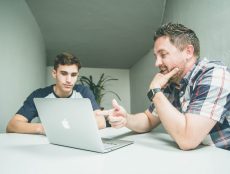
Articles
Editor’s Picks
How Remote Learners Are Faring Amid COVID-19 According to 3 Surveys
By Henry Kronk
April 15, 2020
It has now been over one month since the World Health Organization declared the coronavirus outbreak a pandemic. As lockdowns have now lasted for several weeks, many Americans have transitioned into new routines as remote learners and workers.
Numerous groups and companies have begun to conduct research into how our new collective reality is shaping work, learning, and living habits. We discuss a few below.
70% of remote learners and workers are interested in furthering their education. 80% are considering more remote learning: Emeritus.
The online and remote learning services provider Emeritus, in collaboration with Researchscape’s Omnibus Survey, reached 785 Americans at the end of March. 70% of the respondents said they were more interested in pursuing more education.
A further 80% said they were interested in some form of remote learning. This interest was most prevalent amid respondents aged 35-44.
“There are two things going on in education as a result of the COVID-19 crisis,” said Senior Director at Emeritus, Shaun Dubash, in a statement. “First, schools, universities, and faculty have had to embrace online learning. Second, learners of all ages are now restricted to online education. This crisis has fast-tracked what we thought would take 3 to 4 years to implement, into 3 to 4 months … and we’ll be making progress and adapting for months to come.”
For Gen Z, physical activity is down, TikTok is up: BetterYou.
BetterYou develops a life coaching app that tracks personal activity throughout the day. They recently partnered with 27 colleges and universities to poll student activity during school closures and lockdown.
According to BetterYou, Americans take an average of 5,000 steps per day. Before quarantining and distancing measures were put in place, their users logged an average of 5,786 steps. During the month of March, however, that figure dropped to 2,835 on their platform, a decrease of 51%.
At the same time, social media use has gone way up. Average time spent on TikTok across the platform has increased three-fold. That figure includes a section of users who haven’t downloaded the app. BetterYou is seeing more and more remote learners spending between four and six hours a day on TikTok alone. Instagram use also increased by 40%.
41% of Americans are concerned about their COVID-19-related anxiety: University of Phoenix/Harris Poll.
In the last two days of March, the University of Phoenix commissioned a survey from Harris Poll of 1,055 American adults regarding their mental health during the COVID-19 pandemic.
They found that the greatest source of anxiety was anxiety itself. 41% of respondents said they were most concerned about experiencing heightened anxiety during the outbreak. This answer topped not being able to pay bills (33%), experiencing a work reduction (26%), or losing one’s job (22%).
But at the same time, the poll also found that many Americans were taking steps to improve their mental health during this period of remote learning or work. Six in ten said they had recently checked in with a loved one, 35% had increased their exercise habits, 30% had limited the news they read or view, and 29% had performed a random act of kindness for others.
“It is encouraging to see some people take this time to practice habits that will improve their mental health,” said Dr. Dean Aslinia, counseling department chair at University of Phoenix, in a statement. “Feelings of anxiety are not solely due to isolation or social distancing. The everyday choices we make including technology overuse, impersonal interactions and engaging with people that are unhealthy for us, all lead to anxiety. If something good can come from this pandemic, we can hopefully recognize the need for intentional behaviors that maintain and improve our mental health.”
Featured Image: Evgene Tcherkasski, Unsplash.









No Comments